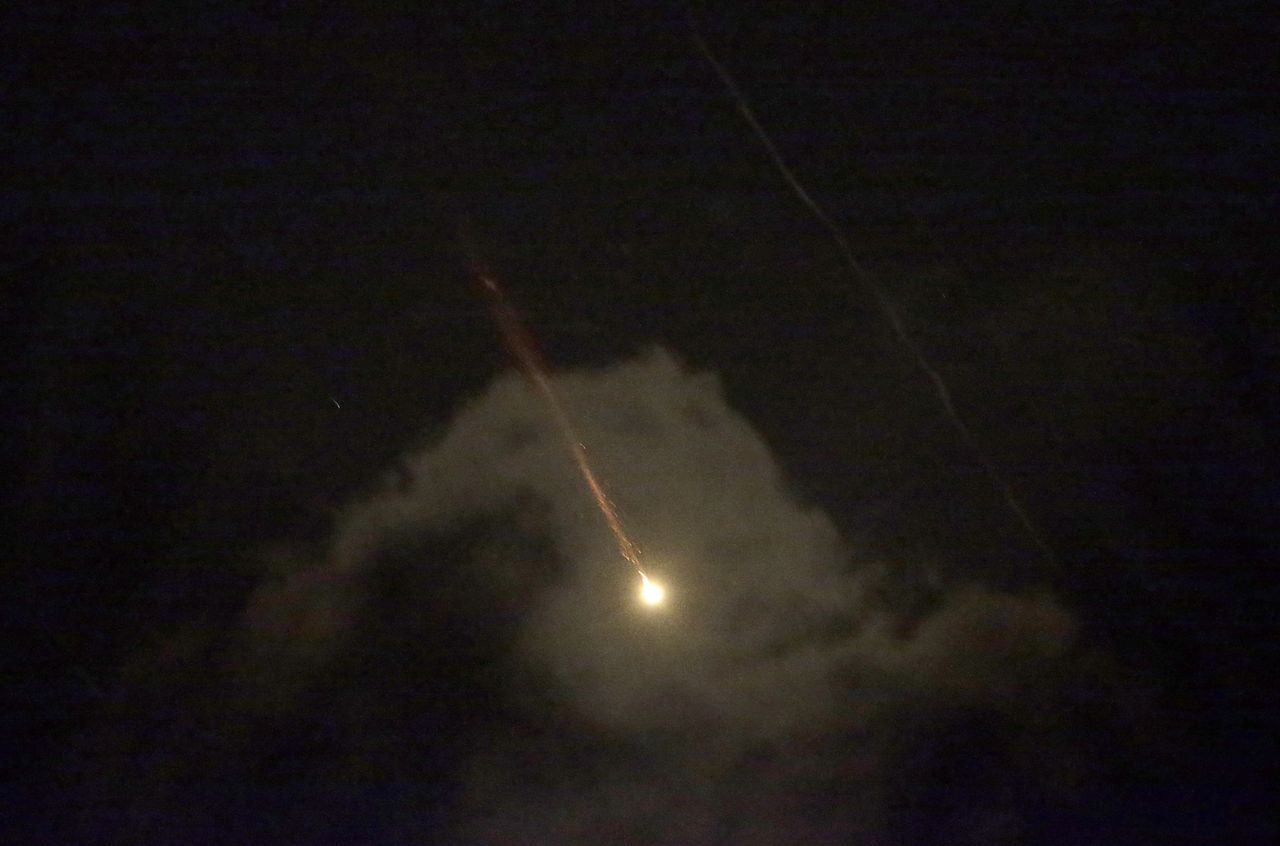
Investors are terrible at assessing geopolitical risks, let alone the prospects of war. But the market reaction to Iran’s attack on Israel tells us something about their current state: Investors may be putting superhigh valuations on stocks, but they’re still capable of making reasoned judgments. Even better, investors aren’t on a hair-trigger to dump their portfolios, so this adds to evidence that we’re probably not in a bubble, at least not yet.
Before getting to the lessons, the logic. Stocks and bond yields fell and oil and gold rose during the day on Friday as investors worried about Iran’s move in the cycle of revenge with Israel. They reversed their moves late in the day and on Monday—with the 10-year Treasury yield on Monday morning back to where it began on Friday morning—as it became clear that Iran didn’t want to escalate. Markets might be wrong to conclude that a wider Middle East war isn’t about to break out. But the price moves had strong internal logic.
This tells us that markets aren’t entirely irrational. In a bubble, bad news is typically either ignored—as belief in the near-magical power of tulips/railways/websites/electric cars/green tech overcomes all obstacles—or has a huge impact as it threatens to force investors to revert to looking at traditional valuation tools. Logic has little place in a market that’s floating on nothing.
The scale of the selloff was also small. Sure, the S&P 500 had its biggest drop in a day since January. But a near-1.5% drop once every three months is nothing, and really nothing compared with what happens in a true bubble. In January and February 2000, as the dot-com bubble was nearing full inflation, stocks dropped 1.5% or more seven times, more than once every two weeks.
This offers some reassurance against talk of a bubble today. But there’s evidence the other way, too.
The first is the flip side of a pick up in volatility: Frothy markets are naturally volatile. During the final year of the dot-com bubble from the start of 1999 to the March 2000 peak the Vix index of implied volatility averaged 24, much higher than its long-run average. The Vix stayed well above 20 during the bubble in clean technology, cannabis, SPACs and meme stocks in late 2020-early 2021, too, with frothy stocks frequently among the biggest daily movers both up and down.
The second piece of evidence is that today’s market again has some extreme moves going on, such as the wild trading in Trump Media & Technology. It has moved up or down by more than 5% on all but two trading days since announcing three weeks ago its ticker would be DJT, initials of Donald Trump, the former president and majority owner.
Investors moonstruck by the possibilities of artificial intelligence have pushed some smaller AI firms to similar silliness, while increased trading in options by individuals is another sign of excess. None of this means there is necessarily a wider bubble, as mini-bubbles in narrow themes have been common over the past decade. But they are a sign of confidence by small investors.
The third piece of evidence comes from surveys of how investors feel. In short: Good. Perhaps too good. The lowest proportion of investor newsletters are bearish since January 2018, just before the “volmageddon” blowup of structured products that knocked 10% off the S&P, according to Investors Intelligence. Bulls outnumber bears by 19 percentage points in the American Association of Individual Investors survey, a gap that has persisted all year and is elevated, but nothing like the 62-point gap of January 2000.
Citigroup combines multiple measures of investor sentiment into its Levkovich index, named for the late Wall Street strategist Tobias Levkovich, and says it is pointing at “euphoric.” That’s a reason for caution, because when investors are already overjoyed, it’s hard for them to get even happier. But it isn’t impossible: A true bubble could still inflate.
It might seem odd to be finding good news in market action driven by a possible war in the Middle East, which would be hugely destructive in lives and livelihoods. Investors who think it likely should buy oil, oil stocks, gold or bonds, particularly after the 10-year yield jumped to 4.6% on Monday on the back of strong retail sales. But be aware that it’s incredibly hard to make money betting on geopolitics. For investors, the weekend’s events are more useful as a way to think about whether there’s too much froth in stocks.
Write to James Mackintosh at [email protected]
News Related-
Russian court extends detention of Wall Street Journal reporter Gershkovich until end of January
-
Russian court extends detention of Wall Street Journal reporter Evan Gershkovich, arrested on espionage charges
-
Israel's economy recovered from previous wars with Hamas, but this one might go longer, hit harder
-
Stock market today: Asian shares mixed ahead of US consumer confidence and price data
-
EXCLUSIVE: ‘Sister Wives' star Christine Brown says her kids' happy marriages inspired her leave Kody Brown
-
NBA fans roast Clippers for losing to Nuggets without Jokic, Murray, Gordon
-
Panthers-Senators brawl ends in 10-minute penalty for all players on ice
-
CNBC Daily Open: Is record Black Friday sales spike a false dawn?
-
Freed Israeli hostage describes deteriorating conditions while being held by Hamas
-
High stakes and glitz mark the vote in Paris for the 2030 World Expo host
-
Biden’s unworkable nursing rule will harm seniors
-
Jalen Hurts: We did what we needed to do when it mattered the most
-
LeBron James takes NBA all-time minutes lead in career-worst loss
-
Vikings' Kevin O'Connell to evaluate Josh Dobbs, path forward at QB
